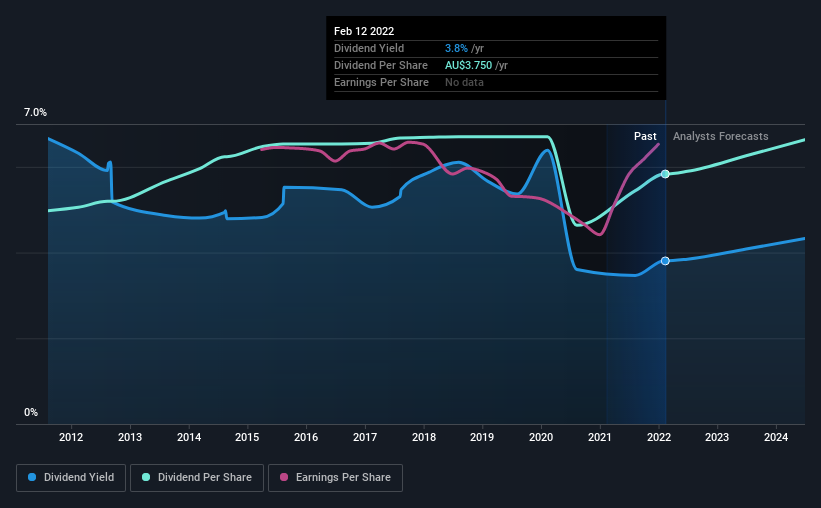Commonwealth Bank of Australia (ASX:CBA) Is Paying Out A Larger Dividend Than Last Year
Commonwealth Bank of Australia (ASX:CBA) will increase its dividend on the 30th of March to AU$1.75. This takes the annual payment to 3.8% of the current stock price, which is about average for the industry.
View our latest analysis for Commonwealth Bank of Australia
Commonwealth Bank of Australia's Dividend Is Well Covered By Earnings
Unless the payments are sustainable, the dividend yield doesn't mean too much. Before making this announcement, Commonwealth Bank of Australia was earning enough to cover the dividend, but it wasn't generating any free cash flows. Since a dividend means the company is paying out cash to investors, this could prove to be a problem in the future.
EPS is set to fall by 1.5% over the next 12 months. If the dividend continues along the path it has been on recently, we estimate the payout ratio could be 63%, which is comfortable for the company to continue in the future.
Dividend Volatility
While the company has been paying a dividend for a long time, it has cut the dividend at least once in the last 10 years. The first annual payment during the last 10 years was AU$3.20 in 2012, and the most recent fiscal year payment was AU$3.75. This works out to be a compound annual growth rate (CAGR) of approximately 1.6% a year over that time. It's encouraging to see some dividend growth, but the dividend has been cut at least once, and the size of the cut would eliminate most of the growth anyway, which makes this less attractive as an income investment.
Commonwealth Bank of Australia May Find It Hard To Grow The Dividend
With a relatively unstable dividend, it's even more important to evaluate if earnings per share is growing, which could point to a growing dividend in the future. Unfortunately, Commonwealth Bank of Australia's earnings per share has been essentially flat over the past five years, which means the dividend may not be increased each year. Growth of 0.9% may indicate that the company has limited investment opportunity so it is returning its earnings to shareholders instead. This isn't bad in itself, but unless earnings growth pick up we wouldn't expect dividends to grow either.
Our Thoughts On Commonwealth Bank of Australia's Dividend
In summary, while it's always good to see the dividend being raised, we don't think Commonwealth Bank of Australia's payments are rock solid. While the low payout ratio is redeeming feature, this is offset by the minimal cash to cover the payments. We don't think Commonwealth Bank of Australia is a great stock to add to your portfolio if income is your focus.
Market movements attest to how highly valued a consistent dividend policy is compared to one which is more unpredictable. At the same time, there are other factors our readers should be conscious of before pouring capital into a stock. For example, we've identified 2 warning signs for Commonwealth Bank of Australia (1 can't be ignored!) that you should be aware of before investing. We have also put together a list of global stocks with a solid dividend.
Have feedback on this article? Concerned about the content? Get in touch with us directly. Alternatively, email editorial-team (at) simplywallst.com.
This article by Simply Wall St is general in nature. We provide commentary based on historical data and analyst forecasts only using an unbiased methodology and our articles are not intended to be financial advice. It does not constitute a recommendation to buy or sell any stock, and does not take account of your objectives, or your financial situation. We aim to bring you long-term focused analysis driven by fundamental data. Note that our analysis may not factor in the latest price-sensitive company announcements or qualitative material. Simply Wall St has no position in any stocks mentioned.

 Yahoo Finance
Yahoo Finance 
